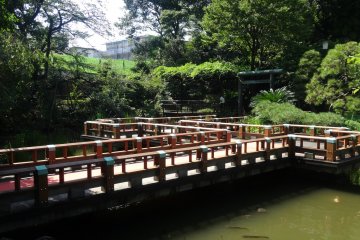
Hidden Garden in Harajuku
Mandy BartokJust steps away from the chaos of Harajuku's Takeshita Street is the hidden garden of the Togo Shrine.

The Tōgō Shrine was established in 1940 and dedicated to Gensui The Marquis Tōgō Heihachirō shortly after his death. This shrine was destroyed by the Bombing of Tokyo, but was rebuilt in 1964. It is located in Harajuku, Tokyo, Japan. There, The Marquis Tōgō Heihachirō is celebrated as a shinto kami. [Wikipedia]

Just steps away from the chaos of Harajuku's Takeshita Street is the hidden garden of the Togo Shrine.

Just off of Harajuku's busy fashion focused Takeshita Street lays the Togo Shrine.
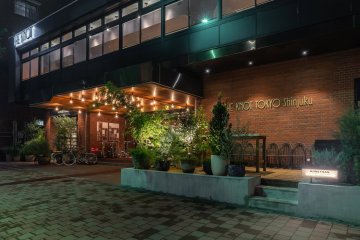
Located right next to Shinjuku Chuo Park, THE KNOT TOKYO Shinjuku is a modern hotel with an exceptional design and easy access to the nearby Shinjuku train station and the Meiji Shrine. The 14-story hotel building was renovated and reopened in August 2018 as THE KNOT TOKYO Shinjuku . The western-style rooms offer a park view on the top floor as well as a newly opened terrace suite. The spacious atrium design offers a relaxed atmosphere and connects the restaurant, bar, lounge and lobby with one another. One of the highlights of THE KNOT is the delicious dishes. There are six areas in which food and drinks are offered. From the grill area to high-quality black tea and fresh bread, everything is on offer.
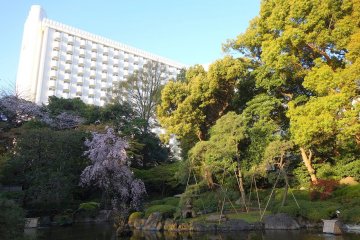
Just minutes from Shinagawa Station, the Grand Prince Hotel New Takanawa is surrounded by lush greenery in the Takanawa area, with rooms offering balcony views of the nearby gardens and the surrounding Tokyo cityscape. This urban resort features convention facilities like the Hiten banquet hall, the international Convention Center Pamir, as well as a wide variety of Japanese, Chinese and Western restaurants.
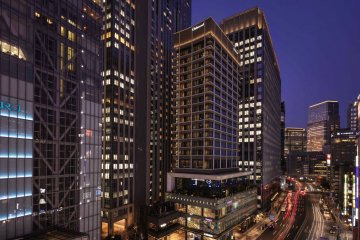
Oakwood Premier Tokyo comes from a brand of standout luxury hotel & service apartments right at the heart of the Tokyo metropolis. It is located in the business hub of Marunouchi with JR Tokyo Station in close proximity. This will allow guests and travelers to easily access the city's extensive transport network and visit various landmarks such as Imperial Palace, Tsukiji Fish Market, Ginza and Shopping District. Boasting 123 luxurious apartments on the upper floors of a multi-serviced complex, each room offers a magnificent view of the city, not to mention all furnished and a fully-equipped kitchen set which is rarely seen in your everyday service apartment. Without doubt, these spacious tranquil retreats are curated to give you the amenities and services of a luxury hotel and a feeling of home. They are good options for both business executives and leisure travelers from one night of a short-stay to a few weeks/months of mid-to-long-term stay.

Mame Shiba Cafe offers a unique experience where you can interact with Shiba dogs while enjoying your favorite drinks. You cannot make reservations in advance through phone or online, so it is best to book early in the morning at a store. The cafe requires customers to make a reservation in-store, present their receipt at the reserved time, and then enter the cafe.

B-Flat Commune is an open-air hangout in Omotesandō featuring a variety of stalls and food trucks offering unique drinks, clothing, and bites to eat. Its relaxed vibe and plenty of seating make it an ideal spot for casual meetups and spending time with friends. It's a creative place where people can gather to eat a the open-air dining space or purchase fashion, antiques, product goods and other lifestyle items. Events are sometimes hosted at this community space, and operating stores may change from month to month.

If you're a fan of Quentin Tarantino’s Kill Bill, there's one Tokyo restaurant that absolutely deserves a spot on your bucket list. While you may not know it by its real name, chances are you've seen it on screen—it’s the unforgettable setting for the iconic, over-the-top showdown between The Bride and the Crazy 88. Known affectionately by fans as “The Kill Bill Restaurant,” this venue offers more than just cinematic nostalgia—it's a vibrant and unique dining experience in its own right. Located in Tokyo’s upscale Nishi-Azabu district, this classic-style izakaya bar is where fiction meets flavor. Though the fake blood and samurai swords have long been cleaned away, the spirit of the film lives on in the architecture and atmosphere. Stepping inside feels like walking onto the set: a grand, high-ceilinged hall with a central open-plan dining space, surrounded by a mezzanine-level balcony—instantly recognizable to anyone who’s watched the movie. But don’t mistake it for just a movie-themed attraction. The Kill Bill restaurant is a serious culinary destination. It offers a wide variety of traditional Japanese dishes, from sashimi and grilled skewers to noodle dishes and seasonal specialties. The menu also boasts creative fusion items like avocado and camembert tempura, which nods to the restaurant’s global popularity and mindset. And for international travelers with specific dietary needs, the restaurant provides vegan and halal-friendly menus (with at least three days’ notice). What makes this spot truly special is its ability to deliver a top-tier gourmet experience while doubling as a pop culture pilgrimage. You can sip sake where Uma Thurman once sliced through waves of enemies—minus the chaos, of course. Whether you’re a die-hard Tarantino fan, a foodie on the hunt for authentic Japanese flavors, or simply someone looking for a unique night out in Tokyo, this restaurant checks every box. Just one tip: Enjoy the drinks and dishes, but leave the swordplay to the professionals. Note: As you’d expect, Gonpachi is a popular restaurant. Same-day reservations are possible, but ideally you’ll want to reserve your table at least two days ahead of your visit, and even earlier if you’re planning to visit at the weekend.
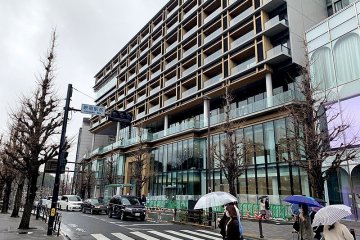
With easy access from Harajuku Station, ‘With Harajuku’ is the premier shopping and residency space for the glamourous fashion Mecca. At With Harajuku, residents can be an active part of the quickly changing trends of Tokyo. In addition to the living area, visitors to the area can take advantage of With Harajuku’s great shopping and dining offerings, including a new Ikea.
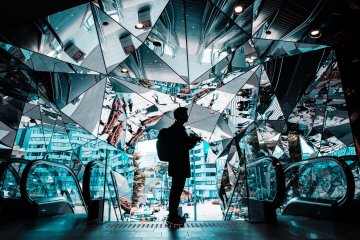
Tokyu Plaza is a multi-storey department store in the Omotesando / Harajuku district of central Tokyo. Opened in 2012 and designed by the architect Hiroshi Nakamura, the shopping complex is known for its eye-catching entrance portal. The escalators lead visitors through a kaleidoscope of mirrors and offer a popular photo opportunity the busy streets of Omotesando in the open air. Flagship stores are located in the basement to the second floor. There are numerous shops on the third to fifth floors that sell clothing, cosmetics and other goods. Popular cafes and restaurants are located on the sixth and seventh floors. There is also the Omohara Forest roof garden on the sixth floor.

Nestled in the heart of Tokyo’s fashion-forward Harajuku district, the POP MART Harajuku Store stands as a flagship destination for fans of designer toys and pop culture collectors alike. This vibrant retail space is part of the global expansion of POP MART, a Chinese brand renowned for its imaginative blind box collectibles. Here, visitors are invited into a colorful world where art, surprise, and creativity intersect. The store offers a wide selection of POP MART’s most beloved characters, including the ever-popular MOLLY, the dreamy DIMOO, the edgy SKULLPANDA, and the mischievous MONSTERS, featuring the fan-favorite character Labubu. Each figure is part of a “blind box” series—meaning the exact design inside the box remains a mystery until it's opened—adding a thrill of anticipation. Labubu, in particular, has captured the hearts of many with its playful yet slightly eerie design, embodying a quirky charm that reflects POP MART’s signature blend of cuteness and character. Fans can often find exclusive or limited-edition Labubu figures available only at flagship stores like this one, making it a must-visit location for collectors. Inside, the POP MART Harajuku Store is as much an art installation as it is a retail space. The interior design captures the essence of the brand’s artistic roots, with vivid displays, themed installations, and interactive features that elevate the shopping experience beyond the ordinary. The layout encourages exploration, allowing visitors to discover new collections and seasonal releases as they move through the space. More than just a shop, the POP MART Harajuku Store is a cultural hub that reflects the fusion of Chinese designer toy culture with Tokyo’s unique aesthetic and street style. Whether you’re a dedicated collector or a curious newcomer, the store offers an immersive experience that celebrates creativity, surprise, and the joy of collecting. For anyone exploring Harajuku, a neighborhood known for its eclectic style and trendsetting spirit, stopping by the POP MART store offers a delightful dive into the whimsical world of contemporary art toys—and perhaps, the chance to take home a rare version of Labubu or another charming character hidden inside an irresistible blind box.